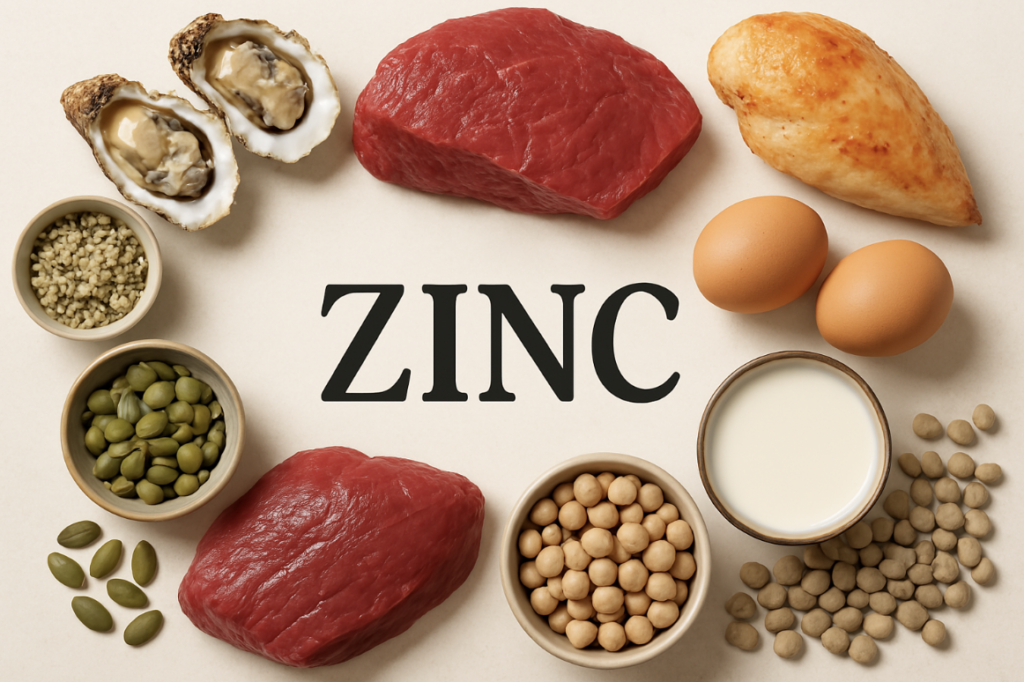Zinc is a trace mineral that may not get much attention—but it’s absolutely essential for immune strength, wound healing, growth, and reproductive health. Even a mild deficiency can weaken your body’s ability to fight infection or maintain hormone balance. In this post, we’ll break down what zinc does in the body, explore its many health benefits, share signs of deficiency, best food sources, and supplement tips so you can optimize your intake the smart way.
What Is Zinc and What Does It Do?
Zinc is a trace mineral required for numerous enzyme functions, immune defense, DNA synthesis, and cell division. It also plays a major role in skin health, reproductive hormones, and your senses of taste and smell.
✔ Key Functions of Zinc:
- Supports immune cell function and inflammation control
- Aids in wound healing and tissue repair
- Maintains skin barrier and collagen formation
- Contributes to testosterone and fertility regulation
- Supports brain and neurological function
💡 Did You Know? Your body doesn’t store zinc, so you need to get it regularly from food or supplements.
Top Health Benefits of Zinc
✔ 1. Boosts Immunity and Fights Infections
Zinc is vital for the development and function of white blood cells. It shortens the duration of colds and may reduce the severity of infections.
✔ 2. Speeds Up Wound Healing
Zinc promotes collagen synthesis and reduces inflammation, helping cuts and burns heal faster.
✔ 3. Supports Skin Health
Zinc is commonly used in acne treatments and helps regulate oil production, reduce inflammation, and support clear skin.
✔ 4. Enhances Reproductive Health
Zinc plays a role in testosterone levels, sperm production, and fertility in men, and supports hormonal balance in women.
✔ 5. Protects Vision and Eye Health
Zinc is concentrated in the retina and helps protect against age-related macular degeneration (AMD).
✔ 6. Supports Cognitive and Mood Function
Zinc affects neurotransmitter activity and may help improve mood, focus, and reduce symptoms of depression.
Signs of Zinc Deficiency

⚠️ Common Symptoms of Low Zinc Levels:
- Frequent colds or infections
- Slow wound healing
- Skin rashes or acne
- Hair thinning or loss
- Poor appetite or altered taste/smell
- Brain fog or mood issues
💡 At-Risk Groups:
- Vegetarians/vegans (due to low zinc bioavailability in plant foods)
- People with digestive disorders (e.g., IBS, Crohn’s)
- Pregnant or breastfeeding women
- Heavy alcohol users
Best Food Sources of Zinc
🥩 Animal-Based Sources:
- Oysters (by far the richest source!)
- Beef, chicken, and turkey
- Eggs and dairy products
🌱 Plant-Based Sources:
- Pumpkin seeds and hemp seeds
- Lentils and chickpeas
- Cashews and quinoa
💡 Tip: Phytates in whole grains and legumes can inhibit zinc absorption. Soaking, sprouting, or fermenting helps improve bioavailability.
Recommended Daily Intake (RDI)
- Adult women: 8 mg/day
- Adult men: 11 mg/day
- Pregnant women: 11–12 mg/day
- Breastfeeding women: 12 mg/day
Higher needs may apply during illness, periods of high stress, or for athletes.
Zinc Supplement Considerations
💊 Common Forms of Zinc:
- Zinc gluconate: often used in lozenges
- Zinc picolinate: highly absorbable form
- Zinc citrate: gentle on digestion
- Zinc oxide: common in topicals but less bioavailable orally
⚠️ Supplement Warnings:
- Long-term high doses (>40 mg/day) may interfere with copper absorption and impair immunity
💡 Best practice: Take zinc with food to avoid nausea, and consider balancing with copper if supplementing long-term.
Pros and Cons of Zinc
✔ Pros:
- Crucial for immunity, hormones, skin, and brain function
- Supports recovery and resilience
- Easy to obtain through both food and supplements
⚠️ Cons:
- Risk of digestive upset with high doses
- Interference with other minerals (like copper or iron) if unbalanced
- Lower absorption from plant-based diets
Zinc may be small in amount, but it has a big impact on your health—from your skin and immune system to your brain and hormones. Make sure you’re getting enough through nutrient-rich foods, and consider supplementation when needed—especially during stress, illness, or dietary restrictions. Keeping zinc levels balanced is a smart move for whole-body wellness.
Read more on vitamin D benefits and deficiency
Learn more about zinc from the NIH Office of Dietary Supplements
